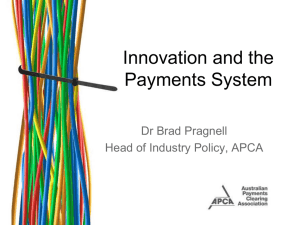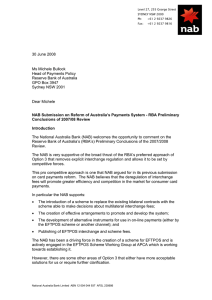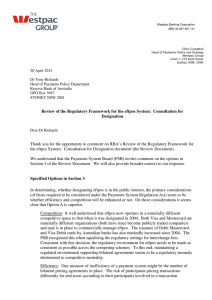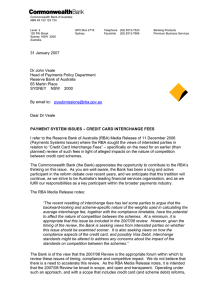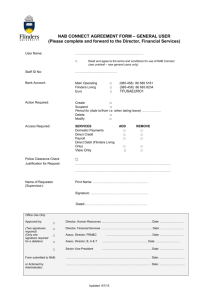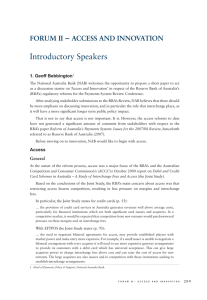31 August 2007 Ms Michele Bullock Head of Payments Policy
advertisement
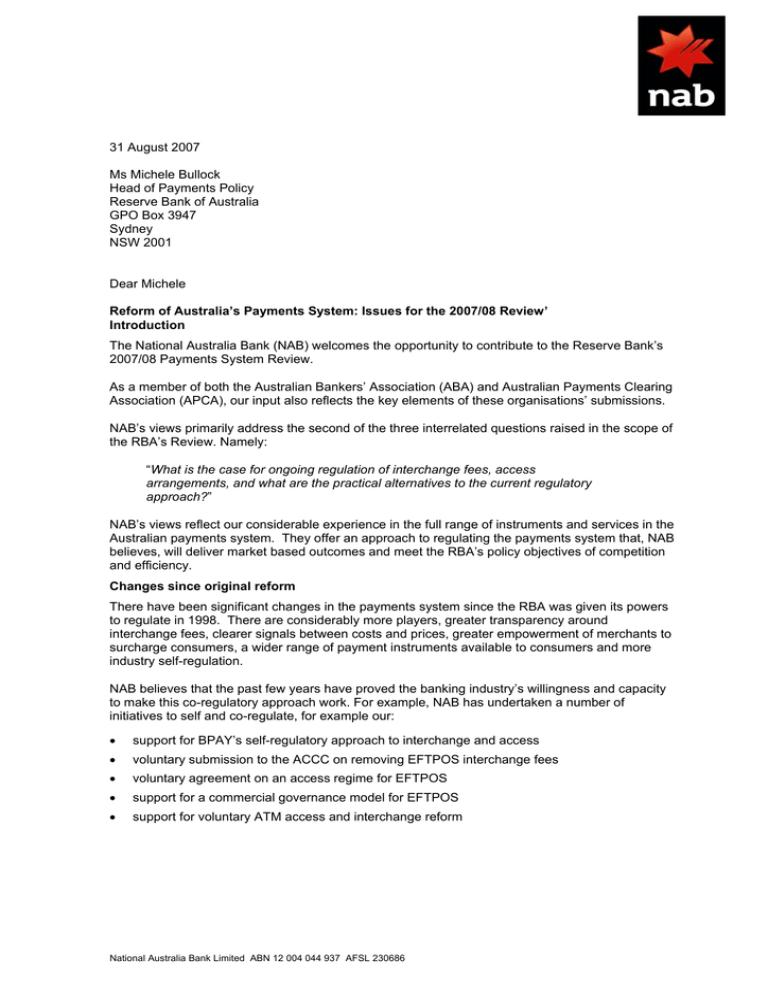
31 August 2007 Ms Michele Bullock Head of Payments Policy Reserve Bank of Australia GPO Box 3947 Sydney NSW 2001 Dear Michele Reform of Australia’s Payments System: Issues for the 2007/08 Review’ Introduction The National Australia Bank (NAB) welcomes the opportunity to contribute to the Reserve Bank’s 2007/08 Payments System Review. As a member of both the Australian Bankers’ Association (ABA) and Australian Payments Clearing Association (APCA), our input also reflects the key elements of these organisations’ submissions. NAB’s views primarily address the second of the three interrelated questions raised in the scope of the RBA’s Review. Namely: “What is the case for ongoing regulation of interchange fees, access arrangements, and what are the practical alternatives to the current regulatory approach?” NAB’s views reflect our considerable experience in the full range of instruments and services in the Australian payments system. They offer an approach to regulating the payments system that, NAB believes, will deliver market based outcomes and meet the RBA’s policy objectives of competition and efficiency. Changes since original reform There have been significant changes in the payments system since the RBA was given its powers to regulate in 1998. There are considerably more players, greater transparency around interchange fees, clearer signals between costs and prices, greater empowerment of merchants to surcharge consumers, a wider range of payment instruments available to consumers and more industry self-regulation. NAB believes that the past few years have proved the banking industry’s willingness and capacity to make this co-regulatory approach work. For example, NAB has undertaken a number of initiatives to self and co-regulate, for example our: • support for BPAY’s self-regulatory approach to interchange and access • voluntary submission to the ACCC on removing EFTPOS interchange fees • voluntary agreement on an access regime for EFTPOS • support for a commercial governance model for EFTPOS • support for voluntary ATM access and interchange reform National Australia Bank Limited ABN 12 004 044 937 AFSL 230686 Recommendations Given these initiatives from the industry and the increased scope for market based approaches, as outlined in the ABA and APCA submissions, NAB believes that the need for direct regulatory intervention has diminished and there is a persuasive case for the RBA to withdraw from regulating interchange fees over time, while retaining oversight of the payments system utilising its powers under the Payments System (Regulation) Act. NAB supports the approach proposed by the ABA and APCA to develop an enhanced approach to self regulation coupled with increased competition. Co- regulation NAB believes that the Industry, through APCA, should work jointly with the RBA to design a mutually agreed co-regulatory process so that the RBA’s policy objectives and concerns are addressed. Furthermore, the industry would benefit from a clear articulation by the RBA of its underlying public policy objectives in terms of payment system efficiency and clearly define both the relevant markets and the criteria for satisfactory competitive efficiency. This would allow the Industry to establish a monitoring process managed by APCA that would enable it to take corrective action to issues that may arise prior to the RBA needing to intervene. Strengthening competition To date, the designation and standards for Interchange Fees combined with the unwinding of the no-surcharge rule have gone some way to enable resource costs to be reflected in end-user prices. However, NAB believes that the signals between costs and prices could be clearer and competitive tension increased by deregulating interchange fees, given the control merchants now have to differentially surcharge scheme based cards. This combination, NAB believes, will provide a comprehensive solution to the key objective of aligning costs to prices. The transition to deregulated interchange fees and full use of differential surcharging would need to be based on criteria agreed with the RBA, aimed at ensuring a level playing field and monitoring of the outcomes. Merchant/consumer competition would also be strengthened by establishing a commercial governance structure for EFTPOS Debit to promote it and enable the feasibility of increasing its functionality to be assessed so that it may compete more effectively against scheme Debit and Credit Cards. Innovation and competition would be encouraged by allowing owners of new/emerging payment instruments to set their own interchange rates from inception and use “no surcharge rules” during start up. NAB hopes these suggestions contribute constructively to the Review process along with the more detailed submissions from the ABA and APCA. Please let us know if you would like to discuss any of the issues raised. Yours sincerely Steve Aliferis Regional General Manager Working Capital Services Andrew Maitland Regional General Manager Consumer Banking Solutions
